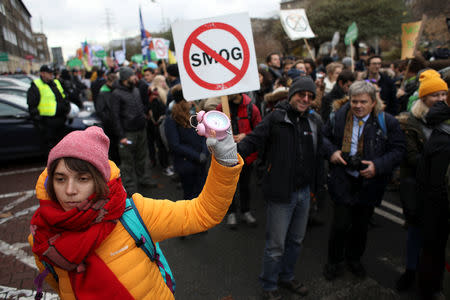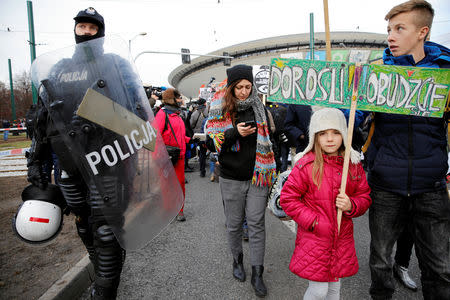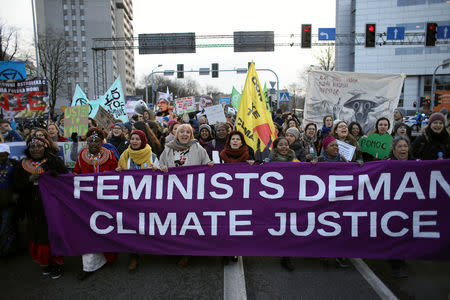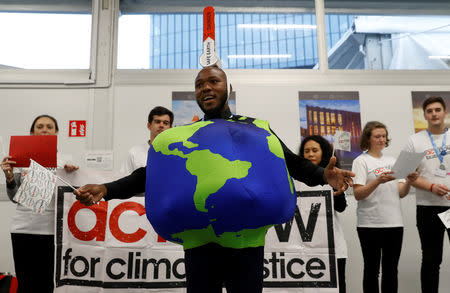Katowice COP24 Notebook: gaps remain in climate science report for Saudis
KATOWICE, Poland (Reuters) - Talks billed as the most important U.N. conference since the Paris 2015 deal on climate change began the crucial final week in the Polish city of Katowice, capital of the country's Silesian coal mining district.
The aim of the gathering is to meet an end-of-year deadline for agreeing a rule book on how to enforce action to limit further warming of the planet.
Below is a flavour of the mood around the event, held in a sprawl of temporary passageways and meeting rooms next to the "Spodek", a flying-saucer-shaped sports and concert venue.
MONDAY
1200 GMT
Saudi Arabia issued a statement saying it recognised the efforts of the United Nations' Intergovernmental Panel on Climate Change (IPCC) in producing scientific reports, the latest of which was published in October assessing the feasibility and importance of limiting warming to 1.5 degrees Celsius.
However, it said there were gaps and uncertainties in the report which still needed further research.
"The Kingdom of Saudi Arabia is hopeful that the IPCC 6th Assessment Report will address these gaps and challenges, and that a consensus to welcome it among all parties can be reached," it said in a statement.
On Saturday, parties failed to reach an agreement on whether to "note" or "welcome" the U.N. IPCC report published in October. Saudi Arabia, Russia, the United States and Kuwait were against welcoming the report and reference to the IPCC report was removed.
0900 GMT
Ministers from around 120 countries started to arrive at the conference and faced the task of breaking deadlocks and divisions to achieve the political compromises needed by the end of the week.
The Polish presidency of the talks said a "significant amount of work" needed to be done to finish work on the rule book. If this outstanding work was not concluded by Tuesday, it would not be possible to conclude that by Friday, it said in a statement.
A JUST TRANSITION IN FRANCE
Campaigners in Katowice said another weekend of the violent "yellow vests" protests in France showed why a just transition is needed when shaping energy transition policy.
"When you look at the demands from the protests in France, it is not pitting climate policy against economic and social policy. It is saying (that) we need to respond to the anxieties people are feeling, the fear people are feeling," said Camilla Born, senior policy advisor at E3G, a non-governmental organisation.
French President Emmanuel Macron will address the country on Monday as he seeks to placate "yellow vest" anti-government protesters who wreaked havoc in Paris this weekend.
U.S. SIDE EVENT
A side event supported by the U.S. administration on Monday afternoon called "Innovative Technologies Spur Economic Dynamism" has been criticised by environmental groups and many countries.
"Since taking office, this administration has proposed to roll back measures to cut methane leaks from oil and gas operations, made it easier for companies to dump coal ash into drinking water, and just days ago proposed easing carbon pollution rules for new coal-fired power plants," said Dan Lashof, director, World Resources Institute US.
"This sideshow in Poland would be laughable if the consequences of climate change weren’t so deadly serious," he added.
The event will feature Wells Griffith, senior director for energy at the National Security Council and Steve Winberg, assistant secretary at the department of energy.
"Presentations at the event will show how innovation and investment have led to dramatically lower technology costs, reductions in all types of emissions, greater competitiveness, and access to affordable, modern energy services," said a senior U.S. administration official.
(Reporting by Nina Chestney, Bate Felix and Agnieszka Barteczko; Editing by Matthew Mpoke Bigg and Susan Fenton)

 Yahoo News
Yahoo News 





